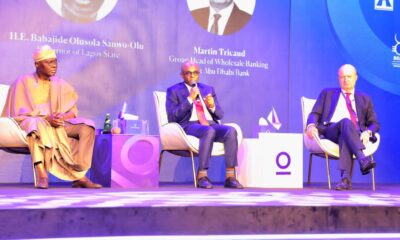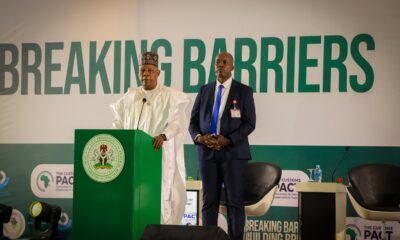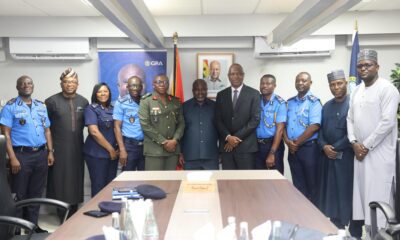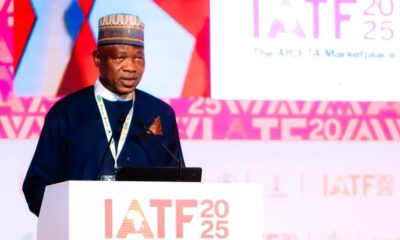Business Focus
AfCFTA: SEREC Accuse Ministry of Transportation, Marine & Blue Economy of Negligence

BY GBOGBOWA GBOWA
Nigeria’s leading maritime, oil and gas sector development minder, Sea Empowerment and Research Centre (SEREC) has challenged the federal ministry of transportation and other relevant authorities about the seeming lack of communication on the activities of the African Continental Free Trade Area (AfCFTA).
SEREC Head of Research, Dr. Eugene Nweke in a release made available to our reporter,raised questions about perceived laxity on the part of the federal government in failing to adequately carry stakeholders along key issues surrounding the success of AfCFTA.
Deploying key instruments of measurement that benchmark the framework and economic development pillars of the continental trade, SEREC charged government and the trading Nigerian public and stakeholders to get more serious in order to access the full benefits of AfCFTA.
SEREC’s position paper captioned: African Continental Free Trade Area (AfCFTA) Implementation: A Call to Action for Nigerian Stakeholders” is reproduced verbatim, below:
The Sea Empowerment and Research Centre (SEREC) is concerned about the lack of information dissemination to Nigerian stakeholders, particularly in the transport, maritime and trade industries, regarding the activities of the AfCFTA Implementation Secretariat. As a result, we are compelled to issue this bulletin to bring attention to the importance of the AfCFTA and the need for Nigerian stakeholders to be carried along in the implementation process, with special focus on the activities of the specialized African transport ministers meeting.
*Key Highlights from the African Transport Ministers’ Meeting*
Based on the available report of activities, the Empowerment and Research Center – SEREC, observed that, the Specialized Technical Committee on Transport, Transcontinental and Interregional Infrastructure, and Energy of the African Transport Ministers has made several key resolutions, including:
– Developing transport infrastructure to aid AfCFTA implementation.
– Addressing poor transport infrastructure, which contributes to higher transportation costs in Africa.
– Projecting 60,000km to 100,000km of new roads by 2030 to meet demands for effective intercontinental connectivity.
– Noting that the infrastructural pace cannot match the increasing demand from African communities and markets, and hence impacting negatively on competitiveness and participation in global markets.
*PIDA-PAP2 Projects and Challenges*
The Action Plan for the implementation of PIDA-PAP2 contains 69 large-scale projects, expected to cost over $160 billion over a 10-year implementation plan. However, project financing and implementation challenges have been encountered, with 50% of PIDA-PAP1 projects failing to reach the construction stage and 30% failing to go beyond the feasibility stage.
*Successes and Challenges in Infrastructure Development*
Despite challenges, successes have been recorded in the transport sector, with 16,066 kilometers of roads and 4,077 kilometers of railways developed. In the energy sector, 3,506 kilometers of transmission lines have been installed, lighting the way for 232 GW of electricity and connecting African electrical networks.
*Impediments to Universal Infrastructure Services*
The impediments to universal infrastructure services in Africa include policy, regulatory, financial, technical, and capacity challenges, as well as new emerging challenges such as climate change, the Russian-Ukraine crisis, recently the Iran-Israel conflict, and disruptions in global supply chains.

*Call to Action for Nigerian Stakeholders*
In light of the above, we urge Nigerian stakeholders to:
– Demand greater transparency and information dissemination from the AfCFTA Implementation Secretariat.
– Encourage the government to harmonize strategies, strengthen cooperation, and accelerate project implementation.
– Advocate for the ratification and domestication of key charters and protocols, such as the Road Safety Charter, Maritime Transport Charter, and Luxembourg Protocol on Railway Rolling Stocks.
– Support the creation of an enabling environment for private sector and public-private partnerships to build institutional capacities and implement necessary policies and regulatory frameworks.
*Questions for Nigerian Government and Stakeholders*
Genuinely concerned, SEREC wishes to find out from the Nigerian government and stakeholders, the following:
– What is the direct impact of PIDA-PAP1 & 2 projects on Nigeria, and how will the country benefit from its leadership role in the AU?
– What is the level of government response and intervention in relation to harmonizing strategies, strengthening cooperation, and accelerating project implementation?
– What policy framework is in place to fast-track the creation of an enabling environment for private sector and public-private partnerships?.
– What is the federal government plans towards the establishment of, “Freight Places concept” or specialized market places, consolidation places, packaging and labeling sub industries along the border corridors via PPP arrangement?.
*Recommendations*
We recommend that the Nigerian government:
– Designate a national correspondence desk for effective coverage of AfCFTA-related activities
– Develop a national policy framework to fast-track the creation of an enabling environment for private sector and public-private partnerships
– Increase investment in infrastructure development to meet the demands of effective interstate and rural connectivity.
– Evolutionize the establishment of “Freigh Places concept” or specialized market places, consolidation places, packaging and labelling sub industries along the border corridors via PPP arrangement.
*Conclusion*
The SEREC calls on Nigerian stakeholders to demand greater transparency and information dissemination from the AfCFTA Implementation Secretariat. We also urge the government to take proactive steps to implement the AfCFTA and address the challenges facing infrastructure development in Nigeria.
By working together, we can ensure that Nigeria benefits from the AfCFTA and achieves its development goals.
Continue Reading





































